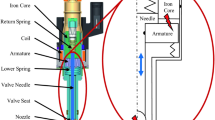Abstract
Sometimes, engine oil is referred to as a factor that affects engine sound and driving feeling. To investigate the difference of engine noise according to the engine oil conditions in the viewpoint of sound quality, the interior and exterior sound of middle-class sedan with gasoline engine was compared under the different oil conditions. Objective analysis was conducted to find the existence of any appreciable change in psychoacoustic attributes. Loudness, sharpness, and roughness are observed as the important sound quality metrics. It was observed that the noise differences were induced by the oil property, temperature and used time. Basically, the dramatic difference is rarely observed with the difference of initial property of oil. According to change of temperature, lower loudness is observed at the high temperature condition. Comparing new and used oils, the relatively high loudness was observed at idle condition after replacing oil, especially in the low frequency range.
Similar content being viewed by others
References
I.-S. Suh, An investigation of sound quality of I. C. engines, Ph.D. Thesis, Department of Mechanical Engineering, MIT (1998).
S.-K. Lee, Objective evaluation of interior sound quality in passenger cars during acceleration, Journal of Sound and Vibration, 310 (2008) 149–468.
R. Ingham, N. Otto and T. McCollum, Sound quality metric for diesel engines, SAE Transactions, 108 (1999) 3003–3007.
A. Gonzales, M. Ferrer, M. de Diego, G. Pinero and J. J. Garcia-Bonito, Sound quality of low-frequency and car engine noises after active noise control, Journal of Sound and Vibration, 265 (2003) 663–679.
G. Kwon, H. Jo and Y.-J. Kang, Model of psychoacoustic sportiness for vehicle interior sound: excluding loudness, Applied Acoustics, 136 (2018) 16–25.
J.-H. Park, H. Park and Y.-J. Kang, A study on sound quality of vehicle engine sportiness using factor analysis, Journal of Mechanical Science and Technology, 34 (2020) 3533–3543.
W.-H. Cho, J.-G. Ih, S.-H. Shin and J.-W. Kim, Quality evaluation of car window motors using sound quality metrics, International Journal of Automotive Technology, 12 (2011) 443–450.
H.-H. Lee, S.-J. Kim and S.-W. Lee, Design of new sound metric and its application for quantification of an axle gear whine sound by utilizing artificial neural network, Journal of Mechanical Science and Technology, 23 (2009) 1182–1193.
H. Fastl and E. Zwicker, Psycoacoustic, Factsa and Models, 3rd Edition, Springer, New York (2007).
ISO, Acoustics-Methods for Calculating Loudness — Part 1: Zwicker Method, International Standard ISO 532-1 (2017).
W. Aures, The sensory euphony as a function of auditory sensations, Acustica, 58 (1985) 282–290.
V. Bismark, Sharpness as an attribute of the timbre of steady sounds, Acustica, 30 (1974) 159–172.
W. Aures, A procedure for calculating auditory roughness, Acustica, 58 (1985) 268–281.
P. Daniel and R. Weber, Psychoacoustic roughness: Implementation of an optimized model, Acustica, 83 (1997) 113–123.
H. Jeong, Sound quality analysis of nonstationary acoustic signal, Ph.D. Thesis, Department of Mechanical Engineering, KAIST (1999).
N. Alt, H.-D. Sonntag, S. Heuer and R. Theile, Diesel engine cold start noise improvement, SAE Technical Paper, 2005-01-2490 (2005).
S.-H. Shin, T. Hashimoto and S. Hatano, Energy distribution for sound quality improvement of exhaust noise of cruiser types of motorcycle, Noise Control Engineering Journal, 63 (2015) 169–181.
Acknowledgments
This work was partially supported by the KRISS grant (KRISS — 2021 — GP2021-0002), the NRF grants (No. 2017R1A 2B4007133) and the Competency Development Program for Industry Specialists of MOTIE, operated by KIAT. (No. P00 17120, HRD program for xEV).
Author information
Authors and Affiliations
Corresponding author
Additional information
Wan-Ho Cho received a Ph.D. degree in acoustics from the Korea Advanced Institute of Science and Technology (KAIST) in 2008. He was a postdoctoral fellow in the Acoustics Laboratory at KAIST from 2008 September to 2010 February and he worked at the Department of Precision Mechanics of Chuo University in Tokyo, Japan, from 2010 April to 2012 February. From March 2012, he joined in the Korea Research Institute of Standards and Science. His research interests are sound-field control by multichannel audio systems, product sound quality, acoustical signal processing, development of measurement method and acoustical metrology.
Sung-Hwan Shin has been a Professor of the Department of Automotive Engineering at Kookmin University, Korea. He received a Ph.D. degree from KAIST in 2004. His research interests are in the field of sound quality based noise control, psycho-acoustics, automotive sound design, machinery real-time monitoring and diagnosis, and signal processing.
Jeong-Guon Ih has been a Professor of Mechanical Engineering at KAIST, Korea, since 1990. His major research interests are in the field of vibroacoustics, product sound quality, and electro-acoustics. His research topics are related with the inverse source identification and field rendering, design of virtual vibro-acoustic field, development of new actuators, and psychoacoustic design of products.
Rights and permissions
About this article
Cite this article
Cho, WH., Shin, SH. & Ih, JG. Sound quality change of the automotive engine noise by variation of engine oil condition. J Mech Sci Technol 36, 4935–4942 (2022). https://doi.org/10.1007/s12206-022-0907-y
Received:
Revised:
Accepted:
Published:
Issue Date:
DOI: https://doi.org/10.1007/s12206-022-0907-y




